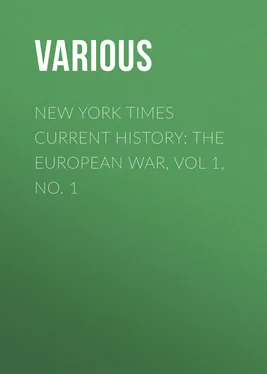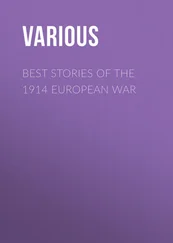Various - New York Times Current History - The European War, Vol 1, No. 1
Здесь есть возможность читать онлайн «Various - New York Times Current History - The European War, Vol 1, No. 1» — ознакомительный отрывок электронной книги совершенно бесплатно, а после прочтения отрывка купить полную версию. В некоторых случаях можно слушать аудио, скачать через торрент в формате fb2 и присутствует краткое содержание. Жанр: foreign_edu, periodic, История, на английском языке. Описание произведения, (предисловие) а так же отзывы посетителей доступны на портале библиотеки ЛибКат.
- Название:New York Times Current History: The European War, Vol 1, No. 1
- Автор:
- Жанр:
- Год:неизвестен
- ISBN:нет данных
- Рейтинг книги:4 / 5. Голосов: 1
-
Избранное:Добавить в избранное
- Отзывы:
-
Ваша оценка:
- 80
- 1
- 2
- 3
- 4
- 5
New York Times Current History: The European War, Vol 1, No. 1: краткое содержание, описание и аннотация
Предлагаем к чтению аннотацию, описание, краткое содержание или предисловие (зависит от того, что написал сам автор книги «New York Times Current History: The European War, Vol 1, No. 1»). Если вы не нашли необходимую информацию о книге — напишите в комментариях, мы постараемся отыскать её.
New York Times Current History: The European War, Vol 1, No. 1 — читать онлайн ознакомительный отрывок
Ниже представлен текст книги, разбитый по страницам. Система сохранения места последней прочитанной страницы, позволяет с удобством читать онлайн бесплатно книгу «New York Times Current History: The European War, Vol 1, No. 1», без необходимости каждый раз заново искать на чём Вы остановились. Поставьте закладку, и сможете в любой момент перейти на страницу, на которой закончили чтение.
Интервал:
Закладка:
Obsolete Tests in the Army.
Another matter needs to be dealt with at the same time. There are immense numbers of atheists in this country; and though most of them, like the Kaiser, regard themselves as devout Christians, the best are intellectually honest enough to object to profess beliefs they do not hold, especially in the solemn act of dedicating themselves to death in the service of their country. Army form E 501 A (September, 1912) secured to these the benefit of the Bradlaugh Affirmation Act of 1888, as the enlisting soldier said simply "I, So and So, do make Oath, &c." But recruits are now confronted with another form (E 501, June, 1914) running "I, So and So, swear by Almighty God, &c." On September 1st, at Lord Kitchener's call, a civil servant obtained leave to enlist and had the oath put to him, in this form by the attesting officer. He offered to swear in the 1912 form. This was refused; and we accordingly lost a recruit of just that sturdily conscientious temper which has made the most formidable soldiers known to history. I am bound to add, however, that the attesting officer, on being told that the oath would be a blasphemous farce to the conscience of the recruit, made no difficulty about that, and was quite willing to accept him if he, on his part, would oblige by professing what he did not believe. Thus a Ghoorka's religious conscience is respected: an Englishman's is insulted and outraged.
But, indeed, all these oaths are obstructive and useless superstitions. No recruit will hesitate to pledge his word of honour to fight to the death for his country or for a cause with which he sympathizes; and that is all we require. There is no need to drag in Almighty God and no need to drag in the King. Many an Irishman, many a colonial Republican, many an American volunteer who would fight against the Prussian monarchy shoulder to shoulder with the French Republicans with a will, would rather not pretend to do it out of devotion to the British throne. To vanquish Prussia in this war we need the active aid or the sympathy of every Republican in the world. America, for instance, sympathizes with England, but classes the King with the Kaiser as an obsolete institution. Besides, even from the courtly point of view the situation is a delicate one. Why emphasize the fact that, formally speaking, the war is between two grandsons of Albert the Good, that thoroughbred German whose London monument is so much grander than Cromwell's?
The Labour Party should also set its face firmly against the abandonment of Red Cross work and finance, or the support of soldiers' families, or the patrolling of the streets, to amateurs who regard the war as a wholesome patriotic exercise, or as the latest amusement in the way of charity bazaars, or as a fountain of self-righteousness. Civil volunteering is needed urgently enough: one of the difficulties of war is that it creates in certain departments a demand so abnormal that no peace establishment can cope with it. But the volunteers should be disciplined and paid: we are not so poor that we need spunge on anyone. And in hospital and medical service war ought not at present to cost more than peace would if the victims of our commercial system were properly tended, and our Public Health service adequately extended and manned. We should therefore treat our Red Cross department as if it were destined to become a permanent service. No charity and no amateur anarchy and incompetence should be tolerated. As to allowing that admirable detective agency for the defence of the West End against begging letter writers, the Charity Organization Society to touch the soldier's home, the very suggestion is an outrage. The C.O.S., the Poor Law, and the charitable amateur, whether of the patronizing or prying or gushing variety, must be kept as far from the army and its folk as if they were German spies. The business of our fashionable amateurs is to pay Income Tax and Supertax. This time they will have to pay through the nose, vigorously wrung for that purpose by the House of Commons; so they had better set their own houses in order and leave the business of the war to be officially and responsibly dealt with and paid for at full standard rates.
Wanted: Labour Representation in the War Office.
But parliamentary activity is not sufficient. There must be a more direct contact between representative Labour and the Army, because Parliament can only remedy grievances, and that not before years of delay and agitation elapse. Even then the grievances are not dealt with on their merits; for under our party system, which is the most abominable engine for the perversion and final destruction of all political conscience ever devized by man, the House of Commons never votes on any question but whether the Government shall remain in office or give the Opposition a turn, no matter what the pretext for the division may be. Only in such emergencies as the present, when the Government is forced to beg the Labour members to help them to recruit, is there a chance of making reasonable conditions for the soldier.
The Four Inoculations.
It is therefore necessary that the War Office should have working class representatives on all committees and councils which issue notices to the public. There is at present, it would seem, not a single person in authority there who has the faintest notion of what the immense majority of possible British recruits are thinking about. The results have been beyond description ludicrous and dangerous. Every proclamation is urgently worded so as to reassure recruits with £5,000 a year and repel recruits with a pound a week. On the very day when the popular Lord Kitchener, dropping even the et rex meus of Wolsey, frankly asked the nation for 100,000 men for his army, and when it was a matter of life and death that every encouragement should be held out to working men to enlist, the War Office decided that this was the psychological moment to remind everybody that soldiers on active service often die of typhoid fever, and to press inoculation on the recruits pending the officially longed-for hour when Sir Almroth Wright's demand for compulsion can be complied with. I say nothing here about the efficacy of inoculation. Efficacious or not, Sir Almroth Wright himself bases his demand for compulsion on the ground that it is hopeless to expect the whole army to submit to it voluntarily. That being so, it seems to me that when men are hesitating on the threshold of the recruiting station, only a German spy or our War Office (always worth ten thousand men to our enemies) would seize that moment to catch the nervous postulant by the sleeve and say, "Have you thought of the danger of dysentery?" The fact that the working class forced the Government, very much against its doctor-ridden will, to abolish compulsory vaccination, shews the extent to which its households loathe and dread these vaccines (so called, but totally unconnected with cows or Jenner) which, as they are continually reminded by energetic anti-inoculation propagandists in largely circulated journals and pamphlets, not to mention ghastly photographs of disfigured children, sometimes produce worse effects than the diseases they are supposed to prevent. Indifferent or careless recruits are easily induced to submit to inoculation by little privileges during the ensuing indisposition or by small money bribes; and careful ones are proselytized by Sir Almroth's statistics; but on the whole both inoculation and amateur medical statistics are regarded with suspicion by the poor; and the fact that revaccination is compulsory in the regular army, and that the moral pressure applied to secure both typhoid inoculation and vaccination both in the regular army and the Territorials is such as only a few stalwarts are able to resist, is deeply resented. At present the inoculation mania has reached the pitch of proposing no less than four separate inoculations: revaccination, typhoid, cholera, and—Sir Almroth's last staggerer—inoculation against wounds! When the War Office and its medical advisers have been successfully inoculated against political lunacy, it will be time enough to discuss such extravagances. Meanwhile, the sooner the War Office issues a proclamation that no recruit will be either compelled or importuned to submit to any sort of inoculation whatever against his will, the better for the recruiting, and the worse for the enemy.
Читать дальшеИнтервал:
Закладка:
Похожие книги на «New York Times Current History: The European War, Vol 1, No. 1»
Представляем Вашему вниманию похожие книги на «New York Times Current History: The European War, Vol 1, No. 1» списком для выбора. Мы отобрали схожую по названию и смыслу литературу в надежде предоставить читателям больше вариантов отыскать новые, интересные, ещё непрочитанные произведения.
Обсуждение, отзывы о книге «New York Times Current History: The European War, Vol 1, No. 1» и просто собственные мнения читателей. Оставьте ваши комментарии, напишите, что Вы думаете о произведении, его смысле или главных героях. Укажите что конкретно понравилось, а что нет, и почему Вы так считаете.











